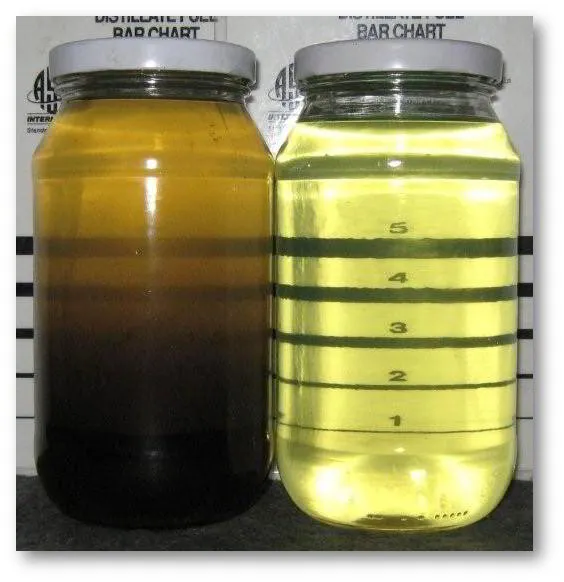Discover the power and efficiency of clean diesel technology. In the ever-evolving world of automotive engineering, clean diesel has emerged as a game-changer, offering a host of benefits that enhance both performance and efficiency. Gone are the days of black smoke and noisy engines – modern clean diesel engines have undergone significant advancements, revolutionizing the way we think about diesel. With improved fuel economy, reduced emissions, and a thrilling driving experience, clean diesel is the sustainable choice for those seeking a powerful yet eco-friendly option. In this article, we will delve into the advantages of clean diesel technology, exploring how it not only delivers exceptional performance but also contributes to a cleaner and greener future. Whether you're a car enthusiast or simply looking for ways to reduce your carbon footprint, join us as we uncover the many benefits of clean diesel and its impact on the automotive industry.
Understanding the basics of diesel engines
To truly appreciate the benefits of clean diesel, it's important to understand the basics of diesel engines. Unlike gasoline engines, which use spark plugs to ignite a mixture of fuel and air, diesel engines rely on high compression to combust the fuel. This fundamental difference gives diesel engines their characteristic efficiency and torque.
Clean diesel engines are designed to meet stringent emissions standards while maintaining the power and efficiency diesel is known for. Through advanced technologies such as common rail direct injection and turbocharging, clean diesel engines have become more refined, quieter, and more environmentally friendly than ever before.
Clean diesel engines also utilize advanced aftertreatment systems, such as diesel particulate filters (DPFs) and selective catalytic reduction (SCR) systems, to further reduce harmful emissions. These technologies work in tandem to trap and break down pollutants, ensuring that clean diesel engines are not only powerful but also environmentally responsible.
The environmental benefits of clean diesel
One of the most significant advantages of clean diesel technology is its positive impact on the environment. Clean diesel engines emit significantly lower levels of greenhouse gases and harmful pollutants compared to their predecessors. This reduction in emissions helps improve air quality, reduce smog, and mitigate climate change.
Thanks to advancements in fuel injection systems, combustion optimization, and exhaust after-treatment technologies, clean diesel engines can achieve up to 90% reduction in particulate matter emissions compared to traditional diesel engines. This reduction in particulate matter, which includes harmful fine particles, can greatly improve public health outcomes, particularly in urban areas where diesel-powered vehicles are prevalent.
Furthermore, clean diesel engines produce lower levels of nitrogen oxides (NOx) – a group of harmful pollutants that contribute to smog and respiratory issues. By implementing advanced exhaust gas recirculation (EGR) systems and SCR technology, clean diesel engines can achieve up to 50% reduction in NOx emissions, making them significantly cleaner and more environmentally friendly.
How clean diesel enhances engine performance
Clean diesel technology doesn't just deliver environmental benefits – it also enhances engine performance. The high torque output of diesel engines provides excellent acceleration and towing capabilities, making them ideal for heavy-duty applications.
Clean diesel engines offer superior fuel efficiency, allowing drivers to go further on a tank of fuel compared to gasoline engines. The higher energy density of diesel fuel, combined with advancements in fuel injection and combustion technologies, enables clean diesel engines to extract more power from each drop of fuel. This improved fuel efficiency not only saves money at the pump but also reduces dependency on fossil fuels.
In addition, clean diesel engines deliver a smooth and refined driving experience. The advanced engineering and precision manufacturing techniques employed in clean diesel engines result in reduced noise, vibration, and harshness (NVH). This means a quieter ride and a more enjoyable driving experience for both the driver and passengers.
Improved fuel efficiency with clean diesel
Fuel efficiency is a key consideration for many vehicle owners, and clean diesel technology excels in this aspect. Clean diesel engines offer a significant improvement in fuel economy compared to traditional diesel engines, as well as gasoline engines.
The higher compression ratios and improved combustion efficiency of clean diesel engines allow them to extract more energy from each unit of fuel. This means that clean diesel engines can achieve higher miles per gallon (MPG) ratings, resulting in fewer trips to the gas station and reduced fuel costs.
Furthermore, the higher energy density of diesel fuel provides an inherent advantage in terms of fuel efficiency. Diesel fuel contains more energy per liter than gasoline, allowing clean diesel engines to travel further on the same amount of fuel. This increased fuel efficiency not only benefits individual vehicle owners but also has a positive impact on the environment by reducing overall fuel consumption.
The role of emissions reduction in clean diesel
Clean diesel technology is synonymous with emissions reduction. By implementing advanced emissions control technologies, clean diesel engines have significantly reduced their impact on air quality and public health.
One of the key components in emissions reduction for clean diesel engines is the diesel particulate filter (DPF). This device traps and removes particulate matter, including soot and other harmful particles, from the exhaust stream. The DPF operates by capturing the particulate matter in a porous ceramic or metallic filter, allowing only clean exhaust gases to pass through. Over time, the trapped particles are burned off through a process called regeneration, ensuring that the DPF remains effective in reducing emissions.
Another crucial emissions reduction technology in clean diesel engines is the selective catalytic reduction (SCR) system. This system uses a urea-based solution called diesel exhaust fluid (DEF) to convert nitrogen oxides (NOx) into harmless nitrogen and water vapor. The DEF is injected into the exhaust stream, where it reacts with the NOx in the presence of a catalyst, effectively reducing NOx emissions. The SCR system, combined with other aftertreatment technologies, enables clean diesel engines to meet stringent emissions standards while maintaining optimal performance.
Comparing clean diesel to other alternative fuels
When it comes to alternative fuels, clean diesel stands out as a reliable and efficient option. While electric vehicles (EVs) have gained popularity in recent years, clean diesel technology offers several advantages that make it a compelling choice for many drivers.
Firstly, clean diesel vehicles have a longer driving range compared to most EVs. Diesel fuel provides a higher energy density, allowing clean diesel engines to travel further on a full tank compared to battery-powered vehicles. This makes clean diesel an attractive option for those who require long-range capabilities, such as frequent travelers or commercial fleet operators.
Secondly, clean diesel technology is more readily available and affordable compared to other alternative fuels. Diesel fuel is widely accessible, with a vast network of refueling stations already in place. This infrastructure advantage, combined with the lower upfront cost of clean diesel vehicles compared to EVs, makes clean diesel a practical choice for many consumers.
Lastly, clean diesel engines offer superior torque and towing capabilities compared to most alternative fuels, including gasoline and natural gas. This makes clean diesel an excellent choice for those who require heavy-duty performance, such as towing trailers or hauling heavy loads.
Investing in clean diesel technology
As clean diesel technology continues to evolve, investing in clean diesel vehicles and infrastructure presents numerous opportunities. Governments, businesses, and individuals alike can benefit from the advantages clean diesel offers.
Governments can support the adoption of clean diesel by providing incentives for clean diesel vehicles, such as tax credits or subsidies. These incentives can help make clean diesel vehicles more affordable and encourage their widespread adoption. Additionally, investing in clean diesel infrastructure, such as expanding refueling networks and promoting the use of renewable diesel fuels, can further support the growth of clean diesel technology.
Businesses that rely on transportation or operate fleets can benefit from the improved efficiency and performance of clean diesel vehicles. By investing in clean diesel technology, businesses can reduce fuel costs, lower emissions, and enhance their overall sustainability efforts. Clean diesel vehicles are particularly well-suited for industries that require heavy-duty capabilities, such as logistics, construction, and agriculture.
Individuals can also reap the rewards of clean diesel technology by choosing clean diesel vehicles for their personal transportation needs. The fuel efficiency, driving range, and performance advantages of clean diesel make it an appealing option for those looking to reduce their carbon footprint while enjoying a powerful and reliable driving experience.
Case studies of clean diesel success stories
Numerous real-world examples demonstrate the benefits of clean diesel technology across various industries. Let's explore a few notable case studies:
1. **Transportation**: The Royal Dutch Touring Club (ANWB), one of the largest roadside assistance organizations in the Netherlands, replaced a portion of their fleet with clean diesel vehicles. This transition resulted in a significant reduction in fuel consumption and emissions, helping ANWB achieve their sustainability goals while maintaining their high level of service.
2. **Construction**: The California Department of Transportation (Caltrans) implemented clean diesel technology in their construction equipment fleet. By replacing older, less efficient machinery with clean diesel models, Caltrans achieved substantial fuel savings and emission reductions. This initiative not only improved air quality on construction sites but also reduced the environmental impact of roadway construction projects.
3. **Marine**: The Danish shipping company Maersk Line introduced clean diesel engines in their container ships. These engines, equipped with advanced emission control technologies, helped Maersk Line reduce fuel consumption and emissions, contributing to their ambitious sustainability targets. The adoption of clean diesel technology in the maritime industry demonstrates its versatility and effectiveness in reducing emissions across different modes of transportation.
These case studies highlight the tangible benefits of clean diesel technology in diverse applications, showcasing its potential to drive positive change in various sectors.
Conclusion: The future of clean diesel technology
Clean diesel technology has come a long way, offering a range of benefits that enhance both performance and efficiency. With advancements in engine design, fuel injection systems, and emissions control technologies, clean diesel engines have become more powerful, fuel-efficient, and environmentally friendly than ever before.
The environmental advantages of clean diesel, such as reduced emissions and improved air quality, make it a compelling choice for those seeking sustainable transportation options. The enhanced engine performance, fuel efficiency, and driving experience provided by clean diesel technology further solidify its position as a viable and competitive alternative to other fuels.
As clean diesel continues to evolve, we can expect further advancements in efficiency, emissions reduction, and alternative fuel options. The future of clean diesel technology holds great promise, offering a greener and more sustainable future for the automotive industry and beyond.


